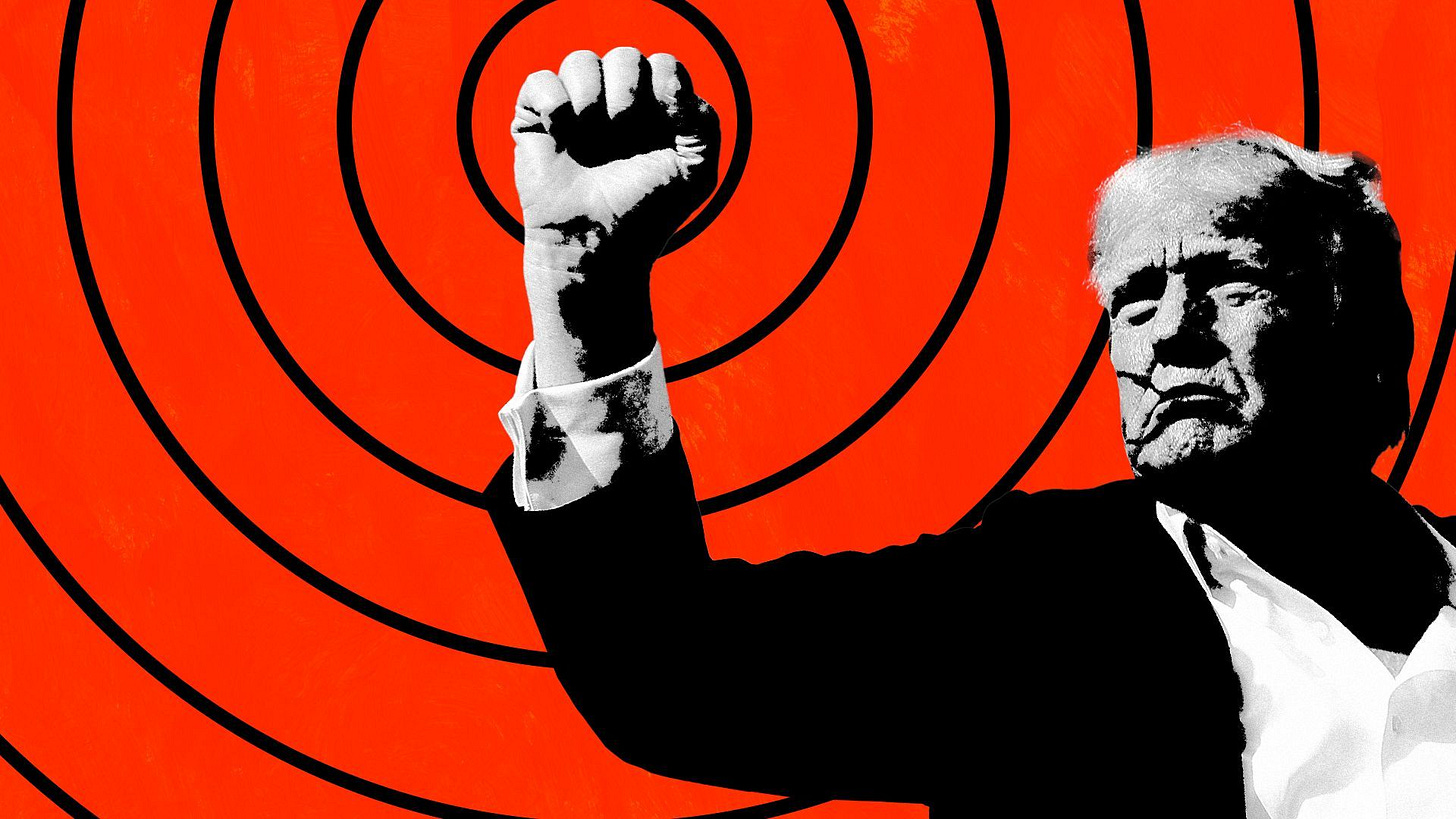the Empathy List #121: Trump and the Evangelicals Who Love Him
A roundup of news about former President Trump... and bad news for those of us hoping to reform the politics of evangelicalism.
Hello friend, Liz here.
Today I’m returning to my column, the Trump Dump.
(AKA“Groundhog Day,” AKA “There’s Nothing New Under the Sun,” AKA “Are you there, God? It’s me, the United States of America,” AKA “WHY, though?”)
There’s almost too much American political news about our presidential candidates to cover in a single newsletter, but I’ll do my best to give an overview of our two favorite octogenarian (okay, one’s barely a septuagenarian) presidential candidates.
And then we’re going to look closely at the news about Trump and evangelicals. (It’s bad news.)
The Trump Dump

For a few months, Trump became a billionaire (again?). His company Truth Social went public to fanfare, enriching the politician and his fellow founders… until its stocks crashed. ‘Cause it turns out that Wall Street had inflated (betted against) the stock, and now the company has entered its rollercoaster era. Truth Social may still turn out to be profitable for Trump Corp long-term, but who knows? (Also, just for fun, Trump has sued his co-founders, former contestants from The Apprentice.)
And Trump has spent this week and last week in a New York City courtroom defending himself from accusations of election interference via the Stormy Daniels “hush money” payments. Because the trial is closed to recording, I’ve been listening to secondhand reports which tell the story of several “catch and kills” directed by Trump leading up to the 2016 election.
In other words, prosecutors are trying to show Trump covering up multiple sex scandals by paying off the whistle blowers.

The meaningful question is, did Trump’s behavior affect the results of election? Would Hillary have won if the stories were printed? (more on this below)
(Meanwhile, as lawyers debated Trump’s morality, Trump fell asleep in court.)

Related: the Supreme Court heard arguments this week about Trump’s claims that he should not be prosecuted related to the January 6th Insurrection because… “presidential immunity.” Meanwhile, droves of his fellow conspirators face charges across the country.
The justices seem unlikely to offer Trump a “get out of jail free” card, though they will likely support certain protections for the highest office in the land. Their final judgment is pending, but the justices may not release their judgement until after the election in November. (Because, why rush?)

In other news, every American is angry about politics right now and every American tells pollsters that they earnestly wish November’s ballot contained different options. We especially dislike our top line candidates.
Even so, the polls seem to favor the former President over the current one. (See this helpful comparison of the latest polls.)
So, Biden has launched a new campaign initiative—trolling Trump—which is SURE to make America fall in love with Joe again.
(BTW, we’re still wondering if Biden’s memory okay cause he told some strange (also moving) stories to Howard Stern in a recent interview.)
Also: Biden and the New York Times are feuding. Hunter Biden is still in trouble. And Biden’s current approval rating sits at a dismal 38% nationally.🥶
But are evangelicals still favoring Trump?
This is my most urgent question. And I believe we have an answer now.
At the beginning of April, the NYT reported that Trump rallies have taken on a religious fervor, ending rallies with a sort of “altar call.”
Long known for his improvised and volatile stage performances, former President Donald J. Trump now tends to finish his rallies on a solemn note.
Soft, reflective music fills the venue as a hush falls over the crowd. Mr. Trump’s tone turns reverent and somber, prompting some supporters to bow their heads or close their eyes. Others raise open palms in the air or murmur as if in prayer.
In this moment, Mr. Trump’s audience is his congregation, and the former president their pastor as he delivers a roughly 15-minute finale that evokes an evangelical altar call, the emotional tradition that concludes some Christian services in which attendees come forward to commit to their savior.
“The great silent majority is rising like never before and under our leadership,” he recites from a teleprompter in a typical version of the script. “We will pray to God for our strength and for our liberty. We will pray for God and we will pray with God. We are one movement, one people, one family and one glorious nation under God.”
Trump’s allies have also begun to draw comparisons between Jesus and the former president. Marjorie Taylor Greene compared Christ’s arrest and Trump’s, saying that “both the former president and Jesus had been arrested by ‘radical, corrupt governments.’” Others have been even more explicit, calling Trump’s legal problems and prosecutions a “crucifixion.”
And, of course, Trump himself is raising money to pay his lawyers by selling Bibles door-to-door (ish).
Pew’s research is definitive though: White Protestant Evangelicals continue to support Trump. When evangelicals attend church regularly, their attitude toward Trump turns slightly more negative, but this does not mean they will refuse to vote for him.
The question is, will Trump’s New York City court case—and his obvious disregard for the “sanctity of marriage”—cause evangelical support to wane, as one former advisor to Biden told Newsweek?
Well, let me return to the question I asked earlier related to the “hush money” case: did Trump’s behavior affect the results of election? Would Hillary have won if these stories about Trump’s affairs were printed?
Q: Do evangelicals consider “character” anymore in the candidates they pick?
A: No. They do not.
In the words of Russell Moore, Christianity Today’s editor, ”…evangelical Christians—including some I listened to pontificate endlessly about Bill Clinton’s sexual immorality (pontifications with which I agreed then and agree now)—ridicule as pearl-clutching moralists those who refuse to do exactly what they condemned Clinton’s defenders for doing, namely, weighting policy agreement over personal character.”
He refers to Ruth Graham’s excellent reporting (see “Piety and Profanity: The Raunchy Christians Are Here” and then read Sara Billups’ excellent breakdown of the essay atBitter Scroll ). Graham describes a cultural shift in the conservative party toward a “boobs-and-booze ethos,” influenced by the internet and supposed traditional patriarchal values (“wholesome lust”).
She points out that while many in 2016 assumed the appeal of Trump to evangelicals represented a “transactional” relationship, 2020 revealed a deeper connection between Trump and conservative Christian voters. Graham writes, “…it’s hard to remain fiercely loyal to a figure like Mr. Trump without being changed by him.”
Trump, in other words, has had a formational effect on the Christians who voted for him.
One white evangelical voter told an NPR reporter during the primaries, “Have you read the Bible? Many people in the Bible were married multiple times and they didn't always do the perfect thing. People aren't perfect. God is perfect."
So, who cares that Trump was married and divorced, boasted about affairs, was convicted for assault? No one, apparently. At least not the evangelicals once committed to purity culture.
The answer is that evangelicals will vote for Trump no matter what. Trump will win evangelicals by a landslide for the third time. Because the Trump debate is dead.

Reflections on Evangelicals and Trump
Friends, I am deeply disturbed by the messianic language Christians and Trump himself is using to describe his presumed role in our nation’s history.
I would deeply despise Trump winning the presidency again. I admit that it scares me.
But what I see as more important than winning or losing an election is this fact: Trump seems to be challenging Christ’s supremacy. Trump is seeking to undermine any authority but himself.
Now, Jesus does not need us to defend Him. I believe, as the Scriptures say, that God sits in the heavens and laughs at those who seek to dethrone Him. Remember the Babylonian King Nebuchadnezzar from Daniel 4 who went mad and “ate grass” for seven years in the wilderness due to the word of God from heaven before God restored his sanity and he repented of his pride?1 (Donald John Trump, beware.)
What disturbs me is the political idolatry that continues to infect church communities across our nation. I do not mean to say that we protestant Christians have encountered a new anti-Christ in Trump—such labels are not helpful, frankly, and only inflame rather than convince. The idolatry I mean is not Trump himself but instead, the church’s obsession with power. Those who claim the name of Christ willingly follow in Donald’s footsteps, rather than in the footsteps of Christ. Why? Because Trump is powerful, and they seek power by association.
I have often thought of Esau McCaulley’s words after the 2020 election that we Christians may need to become comfortable with losing elections.2 Because, by the way, American politics were NEVER meant to bring about the kingdom of God on Earth. Christians should expect a homeless feeling to haunt us throughout our lifetimes. We are a people in exile, made for a place that we cannot inhabit, not yet. The loneliness of “already, not yet” should draw us to our knees, begging God for justice and for the coming of God’s just kingdom.
But the lie of the Moral Majority continues to capture the hearts and minds of Evangelicals: we believe we can have it all. We believe we can worship God and make this world like heaven.
It is true that we can do good here as Christians. We can seek justice, do mercy, and walk humbly. But we cannot make heaven on earth, not with legislation or the right candidate or enough money/power/influence.
Instead of doing good by embracing pluralism with winsomeness and generosity and humility, evangelicals have sought to control, defy, and fly the bird at anyone who disagrees with us. We have labeled our fellow humans as “enemies” instead of neighbors. We have rejected the storytelling of Christ in favor of dictums and laws, demands and judgments.
This is not the way of Christ.
I feel burdened to say this clearly and directly. Because I want to encourage those of us who are seeking to walk in Christ’s way that when we pursue the small, gentle, lowly, and humble, when we exhibit curiosity and empathy toward our neighbor, we are walking as Christ did on this globe.
My prayers for this moment are exactly the same as they were the first time I ever wrote this column. I’m praying for:
-discernment to see truly what’s behind the news and the people in the news;
-patience to embody empathy toward those on the opposite political side, to see them as human beings made by God and loved by God;
-self-control to ignore the news cycle when my nervous system feels elevated and bravery to engage when it means I will be loving my neighbor;
-and humility and courage to speak the truth in love (truly in love) with all gentleness.
Lord, have mercy. We need it. And may God’s kingdom come.
Thanks for reading! Warmly, Liz Charlotte Grant
YOUR TURN: How are you feeling about Trump? About politics? How is this political moment affecting your church, your family relationships, and you yourself?
Side note: I was fascinated to discover that archeological evidence has proven a version of these events did happen to one Babylonian king—though not Nebuchadnezzar.
I cannot find where Esau wrote or said that. If you know, would you post a link?


